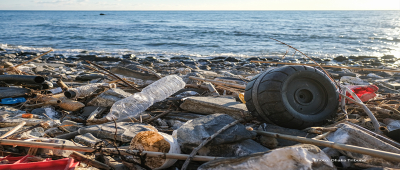BANGLADESH:Two hundred thirty rivers in Bangladesh carry billions of tons of sediment into the Bay of Bengal. Industrial units situated on Bangladesh’s coastal region discharge enormous amounts of toxic substances containing solid and liquid waste.
The leading industrial hubs include Dhaka, Narayanganj, Gazipur, Chattogram, Khulna, Rajshahi, and Bogura districts. The industrial discharge from these regions mixes with the soil and water, and eventually damages the marine environment. The United Nations estimates that land-based sources are responsible for 80% of total marine pollution. Though Bangladesh has no maritime policies to protect its resources from pollution, in 2004, the Department of Shipping drafted the Marine Environment Conservation Act — which has yet to be passed.
Bangladesh has passed legislation to safeguard and maintain the maritime environment like other nations and approved most international treaties and laws protecting marine pollution that is governed globally. Still, these treaties have yet to be ratified since there is no sufficient national legal framework, nor is the government prepared to form one. The public sector’s main issues are concerned with conventional institutional-feudalism and out-of-date, inactive legislation. Nevertheless, in the context of the current government’s blue economic growth policy, it is necessary to establish a marine environment protection policy focused on preventing marine pollution.
Given the lack of uniformity in our domestic laws, Bangladesh must enact a comprehensive “Marine Pollution Prevention Act,” keeping the fundamental relationship and contents of discussed national and international conventions and acts. We can learn from international experience in developing legal frameworks to combat marine pollution. International agreements, customary law rules, and general legal principles determine international legal policies to protect the marine environment.
The Bangladesh Marine Research Institute (BORI) recently established coastal and marine research, including marine environmental protection. To implement this approach, Bangladesh needs a sufficient number of maritime agencies to manage various stakeholders and organizations related to marine environment protection through numerous policies, laws, orders, and regulations. Oversight, evaluation, and public participation could be improved with the progress of various ocean initiatives.
In Bangladesh, the Territorial Seas and Sea Areas Act (TWMZA) was passed in 1974 and enacted to promulgate Bangladesh’s all-maritime territory and its sovereignty. The Territorial Seas and Seas Regulations (TWMZR) were introduced in 1977 to supplement the law. Section 8 of the TWMZA authorizes governments to establish comprehensive marine pollution regulations, but contains no specific provisions or instructions. The TWMZR provided little information in Section 3 on vessel injuries embodying intentional or severe marine pollution during fishing. The investigation or conduct of research activities was deemed to violate national law.
The new Marine Pollution Prevention Act’s function should be in advising the government on developments in marine pollution control in Bangladesh based on legal issues. This act should guide the actions of different agencies and departments and create awareness among the general people about the impact of marine environmental pollution. Coordinating, monitoring, and evaluating target-based achievements of the mission should also be stipulated.
The Ministry of Environment & Forest can play a crucial role in implementing and enforcing the maritime environmental law and ensure the environmentally sound conservation and development of the coastal and marine ecosystems. This proposed legal framework could prevent all internal and external activities from polluting the coastal and marine areas. It will strengthen the necessary research to preserve and develop the coastal and marine environment and resources.
To ensure green growth of ocean development, it is necessary to reduce, reuse and recycle management and make CDM programs for all coastal cities and towns. Enforcement of laws should be done after monitoring, inspection, survey, examination, and approval of EIA to control offshore industries’ pollution, as Bangladesh still needs to enact the necessary domestic legislation regarding its international obligations.
Therefore, the Marine Pollution Prevention Act should be a priority for the government. The law may be further amended to include border controls, international cooperation, and maritime security. In order to prevent, reduce and control pollution of the marine environment, the “Marine Pollution Prevention Act” can act as an umbrella of the Marine Environment Law which provides for the overall protection of the marine environment in Bangladesh.
Source: Dhaka Tribune, 15 February 2023

